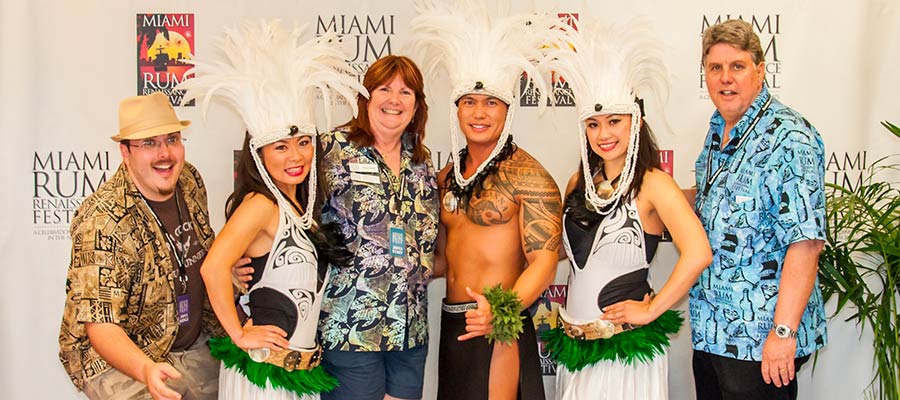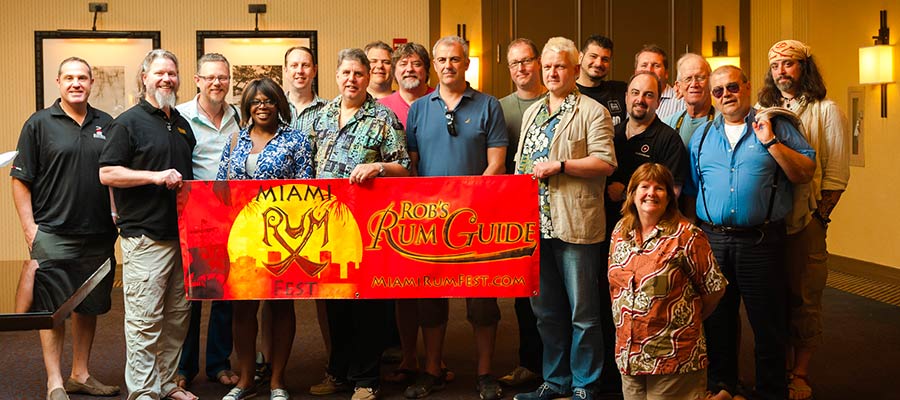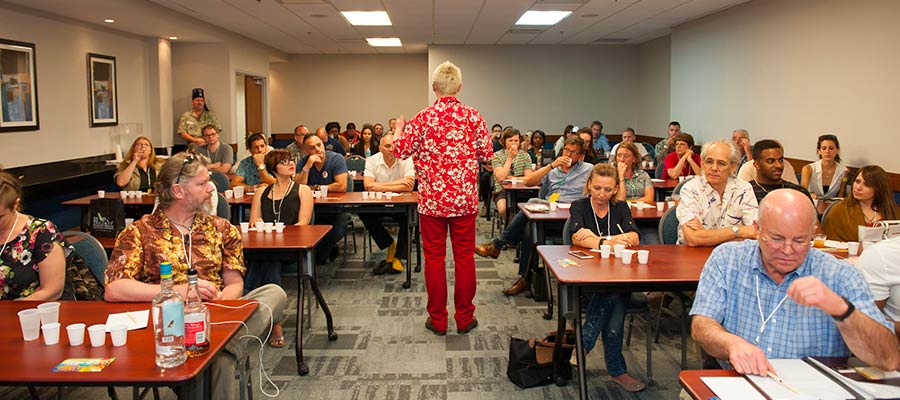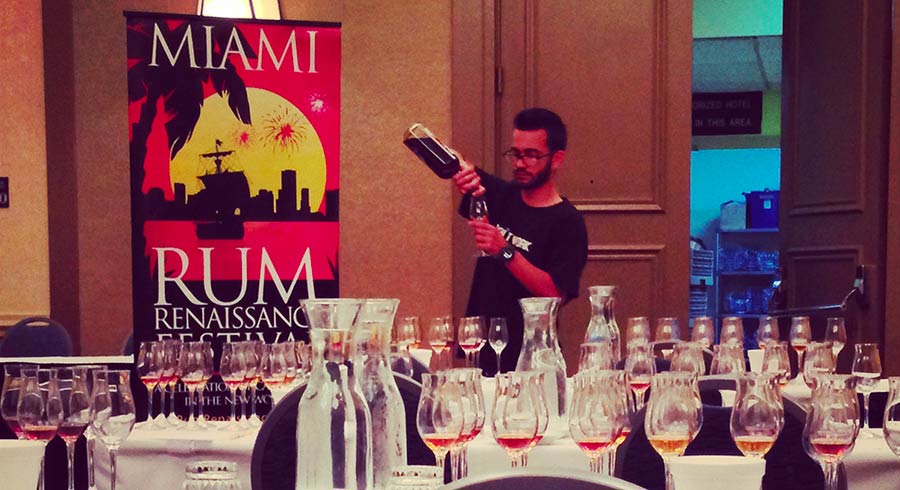From Berlin and New York, to Paris, Rome, Madrid and Athens, many big cities in Europe and the United States, host annual rum festivals. Without a doubt, The Miami Rum Renaissance Festival was a pioneer and an inspiration for many of them.

This year the festival is celebrating the 10th edition and to celebrate it, some changes have been made in order to surprise the attendees. Maybe the most important one is that the festival will leave the city of Miami for a new location in Fort Lauderdale, next to the sea.
Behind this symbolic festival are Robert and Robin Burr. For those who may not know them, Robert and Robin have been a technologists and media specialists involved in many disciplines from audio and video production, to photography and film, print and electronic publishing. They enjoy spent a lifetime scuba diving around the world, being activist in their local community and contributing to many social and civic organizations, but most of all, sharing their passion for the rum world with the people.
Rumporter met them in the context of Paris Rhum Fest and could not let the opportunity slip away to ask them about the Renaissance Rum Festival that will take place in June 9th and 10th.
Rumporter: Robert & Robin, for our readers that are starting to get involve into the rum community, can you tell us what made you jump ship from scuba diving into the world of rum?
Rob: Rum is not my sole profession, but it is a passion that I take seriously.
For many years, I saw a big gap in the understanding and respect for rum. In 2005, I began a campaign to promote awareness and appreciation, to prove that rum was not ordinary, rather it was fascinating.
I began by organizing some small rum tasting events with friends, sharing my discoveries. I participated in some rum tasting competitions to expand my knowledge and understanding of cane spirits. In 2007, I started publishing Rob’s Rum Guide, a small guide to the best rums I knew. In 2008, organized a non-profit fundraising event for 150 people to taste fine rums. It was a resounding success. This led to the first Rum Renaissance Festival in 2009.
Robin: I became a scuba diving instructor in 1987. During that time, Rob and I published a scuba diving magazine called Fisheye View, which gave us the opportunity to travel the world to exotic places to scuba dive. Every island we visited prided themselves on having the best rum, thus our passion for this wonderful spirit.
Our travels and love of rum brought us full circle to eventually publishing a guide to rum, originally called Gifted Rums and evolving into Rob’s Rum Guide. After that, the rum festival was the next logical step in our progression to help others discover this truly unique spirit.
Rumporter: This year the Rum Renaissance Festival is celebrating its 10th anniversary, making it one of the oldest rum festivals in the world. What inspired you to organize a rum fest and how did the industry react?
Rob: I felt the public needed an opportunity to truly discover many fine rums and the best way was to organize a grand tasting event.
In Miami, this was not difficult because so many rum companies are based here or have a team on the ground here. I said “I’d like to help you promote your rum to people that are eager to learn more about rum.” Everyone said yes, of course. We also had a great reaction from bartenders, food and beverage managers, liquor store retailers and many others across the spirits industry who want to be up-to-date on their rum knowledge.
The biggest obstacle is always publicity and promotion. I have been to rum events that are poorly attended. It’s so disappointing. We made our priority getting the word out about the event on television, on radio, in the newspapers, and via email to people who signed up for our mailing list. Social media was just developing, but we had a lot of experience as electronic media publishers. The public responded and reactions from exhibitors were excellent.
Robin: Because of Rob’s expertise, he was invited to judge at a small rum festival in Tampa. Since this was such a positive experience, my suggestion was to create our own rum festival and blind tasting competition here in Miami, which is much more of a easily accessible travel destination than Tampa.
Together with our individual talents and drive we put on a very successful show which was, quite honestly, a head of its time. Over the years, we have grown the festival and made it into something people look forward to attending. We love educating others about rum and have joined together countless rum enthusiasts from around the world, who all come to South Florida once a year to network.
Rumporter: How did the festival grow? In your opinion, what were the best decisions that make the festival into what it is today, and what your biggest mistakes?
Rob: In 2009 we started with 1,110 attendees, then 2,300 the next year. We were doubling each year. The number of brands participating just kept on increasing. Many new brands debuted at the rum festival.
By 2014 we exceeded 12,000 attendees and that was too much. We stopped selling tickets at the door and stopped advertising to the public. We made a concerted effort to downplay the party aspect of the event and to promote the fine tasting aspect. This made a big difference in the quality of attendees. The quantity of people is no longer our goal. Attracting quality rum enthusiasts is our goal.
Over the years, large companies became less interested and small emerging brands took the lead. Our rum enthusiasts always enjoy finding new and exciting product. While they still enjoy the great popular rum brands, they are always looking for the next new thing, a special limited edition or a unique boutique expression.
Robin: I am in agreement with Rob in that the festival grew too large by 2014. I think all of the rum festivals that have developed all over the world are experiencing the same growing pains. There is a point where the festival becomes a party and is no longer an educational experience.
Now, of course, rum is not a stuffy spirit and we have constantly used the term, Rum Is Fun! However, we do want to make sure we are attracting the quality rum enthusiast who wants to learn while having a good time and a fun experience. It is all a balancing act and it has taken time to create the exact equilibrium.

Rumporter: Organizing a festival for 10 years is easy to say but I think really difficult to achieve. Is there a natural wear and tear after all this years? Could this be a reason for the relocation? Can we talk about the “renaissance” of the Rum Renaissance Festival?
Rob: It’s a lot of work, no doubt about it. We have a unique set of skills that works suitably in this case. Our team is extremely well organized and we’re proficient at observing deadlines.
Our focus is on the quality experience of the attendee. Of course, we’re sensitive to the needs and desires of all exhibitors, but we care very much about the consumer experience. Attendees from out of the country always want to be on the beach, at the ocean, near the nightlife. Local ticket buyers are just the opposite. They hate the traffic, parking problems and over-crowded aspects of the hyper-tourism areas. It’s a difficult compromise.
Every year, many big hotels, convention centers and special event venues ask for our business. We weigh all the factors and make the best decision possible for all involved. For many years the team at the Fort Lauderdale Convention Center has been trying hard to get us to move the show there. They have a compelling argument, a great facility, an excellent location. Our expanding market for ticket sales is more than six million consumers from Miami to Palm Beach and beyond. The Fort Lauderdale location is central to the larger market.
We have frankly been surprised at all the positive reactions to the move, along with a few complaints, of course. Many rum brands are excited about the change and eager to reach out to this expanding population beyond Miami.
Robin: One of the biggest challenges most people were probably not aware of was the huge corkage fees which most facilities wanted to impose on the festival. That, as well as parking and reasonable room rates drive us from Miami Beach. Although we truly enjoyed working with the MACC (Miami Airport Convention Center) we found the people coming in from out of town wanted to be near the beach and on the water.
I think that Ft. Lauderdale is the answer as we have had a lot of positive comments since we announced the move. But we had to keep in mind the facility has to be easy to drive to and have lots of parking. We are now very centrally located in Broward County, so folks from Miami-Dade can drive up and those from West Palm Beach and further north can drive down, and we are pretty much in the middle of the metropolitan area.
Rumporter: Another big surprise is that this edition will be related to the Hukilau festival, a tiki fest also taking place in Fort Lauderdale at the same time. Tell us more about the Hukilau and this collaboration. According to your point of view, is the tiki culture part of the rum world or is it vice versa?
Rob: We have long been fans and participants in tiki events, including the Hukilau in Ft. Lauderdale. It was interesting to consider changing our dates to coincide with this popular tiki gathering. As we researched and had conversations with the Hukilau organizer, we saw no downside to the timing.
While a small percentage of our regular attendees are serious tiki fanatics, almost every tiki fan is a rum enthusiast. We know that tiki is fun. Rum can certainly be fun. So, the combination is fun on top of fun. With rum.
We expect many of our rum fest attendees to now discover the fun and love of tiki and we’re happy to share that love with them.
Robin: Our son Robert and I are members of the Fraternal Order of the Moai. The local chapter, Gumbo Limbo, are my volunteers for the festival. Those who have attended to the festival may have seen them wearing their strange hats called a Fez.
We are all very much fans of tiki culture and our organization is dedicated to preserving it. We actually all met many years ago at the Hukilau and have been great friends every since.

Rumporter: One of the things that I was able to observe when I first visited the Rum Renaissance Festival a couple of years ago was the great variety of local brands participating. Is this something that will come back in the 10th edition? Do you think micro and artisanal distilleries are the future of the rum industry?
Rob: We’ve been promoting local and domestic rum producers since the beginning. We’re making it easier for very small brands to participate and they’re responding. So many of these talented rum producers bring a serious level of passion and dedication to their efforts. As the trend of more and more micro-distilleries continues, we want consumers to discover the best of the best. Since most have limited distribution, it’s not easy to find them at every liquor store.
There is great diversity in the manner of production of American rums. Some use very high quality molasses, pot stills and fresh oak barrels. Some use sugar, others use dehydrated cane crystals, cane syrup or a combination of sources. There are many configurations for stills and may variations on the fermentation process. Used bourbon and whiskey barrels are combine with cask from beer, sherry, cognac, and different wines.
Historically speaking, before the American Revolution of 1776, there were more than 8.000 distilleries along the east cost of North American.
Most were making rum from cheap molasses available from the Caribbean island sugar plantations. The New American Rum Revolution is an exciting phenomena, re-establishing many of these long-lost production facilities in large and small towns across the nation. It’s a return to the original authentic small boutique model that supplied the market for American rum 250 years ago.
Robin: As the rum market is growing, small artisanal brands are creating some very interesting and delicious rums. This trend has been building for quite some time and I feel Rum Renaissance has helped bring many of these fine, small batch rums to the attention of the consumer.
Brands like Siesta Key and Wicked Dolphin came to our festival, where no one had ever heard of them, and won Best In Class medals in the RumXP Blind Tasting Competition. They were suddenly noticed and significant. I think this will continue to be the case and more and more small batch rums will continue to be born.
Rumporter: Another thing I found really interesting was that in the Renaissance Rum Festival, awards are granted by two different panels, one of experts and one of consumers. What is the main reason of having a consumers panel? Do the results from both panels are different?
Rob: The Rum Expert Panel judges are a savvy bunch of spirit professionals with plenty of experience judging rums in competitions around the world. Some might perceive them as rum snobs. That’s not true, but I know some believe it. They represent the very best of the best in terms of evaluating fine rums, but they don’t necessarily represent what’s trending in the market in terms of popularity.
Ultimately, that’s decided by consumer dollars.
Over the years of the Rum Renaissance Festival, we have met many serious rum enthusiast consumers that have large rum collections, visit distilleries, join social media groups for rum enthusiasts and love to collect many expressions. They’re not professionals, but we very much value their opinions, as do rum producers.
It’s our goal to study and evaluate the difference between these two groups over many years to help determine shifts in awareness, preferences and reactions to new products, as well as long established brands. We’re also trying to determine which of these enthusiastic consumers have a true talent and ability to perceive the nuances of fine rums, lets say a gifted palate.
Together, the RumXP judges and the Consumer Rum Jury members offer valuable insight and constructive guidance to others who are trying to navigate the vast ocean of rum expressions available for purchase.
Robin: Rob was the first to organize the Rum Experts and create one group referred to as the RumXPs. Over the years, we have hosted an event called, “The Great Rum Challenge.” During this event, which has taken place at our own festival, as well as at Ohana, Luau at the Lake and Luau by the Sea, two other tiki events we have enjoyed sponsoring over the years. We have come across consumers who have some incredible palettes and knowledge of rum, and often some great collections, but they do not make their living in the spirits industry.
The winners of the Great Rum Challenge are given an opportunity to participate in the Consumer Rum Jury. The feedback has been really wonderful and we are so happy to afford these folks the opportunity to see what it is like to be a judge in a blind tasting competition. It is certainly interesting and advantageous to have the separate data from both panels and we able to compare them.
Rumporter: The Rum Renaissance Festival was one of the very first shows around the world and as the name implies, it was a big showcase for the renaissance of rum. The success of the festivals has been such that nowadays there is one in each country and there are even countries hosting 2 or 3 throughout the year. Don´t you think there is a saturation of festivals? In addition to the Rum Renaissance Festival, what would be the other 3 fest that you like the most or those 3 that the rum aficionado can not miss?
Rob: The market for rum is growing, so the increasing number of events that offer an opportunity to taste, savor and discover rum is a positive trend. Eventually, there may be only a few large events as smaller regional and local events gain popularity. This is a good trend.
I am privileged to have attended most of the major rums festivals in the world, from Athens and Rome to Berlin and Paris, Madrid and Barcelona, Prague, London and Manchester, Belgium, Puerto Rico, Haiti, Grenada, Barbados, Hong Kong, Mauritius, Los Angeles, San Francisco, Chicago, Philadelphia, New York, Tampa.
Among the most outstanding over a long time have been Berlin, London, Rome and Paris. The combination of a very well organized tasting event held in a delightful location is simply magnificent. You find many rum expressions not available elsewhere, you meet the most interesting people, you learn more about rum, culture, local customs and history. What could be better?
Robin: Like Rob, I have participated as a judge in blind tasting competitions at many festivals around the world. It is both an honor and a privilege and despite what some think, a difficult job.

Rumporter: On the other hand, why is so important to every festival to host its own awards? With festivals that give medals here and there, don´t you think this can confuse the average consumer about the quality of rums? Also Some important figures in the rum industry have criticized the Rum Renaissance Festival because “almost all the brands that participated won a medal”, what would you answer to them?
Rob: It’s a natural endeavor for each territory to consider the best rums in their area and express these ratings though rum awards. In all honestly, some rum tasting competitions are poorly organized. Its no trivial matter to collect, classify, prepare and execute a proper tasting competition. I have great respect for anyone who attempts it and massive respect for those that do it well.
To say that all rums have received a RumXP medal is just unfounded negativity and bellicose verbiage. I’ve heard people declare that Planation Rums must pay for their medals since that always seem to win so many. Or, maybe they just make rums that impress the judges. Seasoned statisticians calculate the results and the numbers stand as they are. Many surprise results have been revealed, many predictable winners disappointed.
Everyone has a right to their opinion, but facts are facts. More than 120 rums are entered each year. In a flight with 19 to 24 rums, the chances of winning best in category or a gold award is relatively small.
In the case of the RumXP judges, I must say that these are disciplined, honest, people of integrity with great respect among their peers. To insult their awards is to insult their good character. Some also say Elvis is not dead. You can believe it or not.
I consider any and all rum awards as a reflection of the moment, the place and the situation in which they were expressed, not the final determination of anything.
Robin: My son Robert and I organize both the RumXP and CRJ competition. We conduct the competition as we would like it to be conducted if we were judging. It is truly a blind tasting, no matter what anyone may say. We have an incredible team of volunteers from 786-Bartend led by Isaac Ergas to pour the rums. Their work is scrutinized by their leader to perfection.
We have statisticians who enter all the data from the judges meticulously so the results can be tabulated. Everything is triple checked. As Rob said, it is truly a huge undertaking but my organizational skills are top notch and I don’t think there are many other there that can recreate what I do.
The numbers are the numbers and I invite anyone to come and work by my side to see how it is done behind the scenes. Our integrity is above board and the rums that walk away with the medals have the highest scores at that time, on that particular day, from those judges.
Rumporter: In addition to the Rum Renaissance Festival, you also organize the Rum Renaissance Caribbean Cruise, an excellent opportunity to visit several distilleries in a single trip, can you tell us more about this adventure? Also, are you working in a new project in the rum world
Rob: The annual Rum Renaissance Caribbean Cruise of November 2017 was postponed due to hurricane damage in the northeast Caribbean. Puerto Rico, St. Croix and Sint Maarten were among the worst affected areas. It will take time, but I predict that by November 2018 they will be sufficiently recovered to make a visit to the distilleries completely delightful once again.
The modern cruise ship offers a unique opportunity to visit many islands without going through customs and without the restrictions and difficulties of carrying rum onboard the aircraft. We can visit at least one distillery each day, sometimes two or three, as well as rum shops, bars, restaurants and liquor stores along the way.
For rum collectors, it’s a great opportunity to find some wonderful rums that might not otherwise be available, at attractive prices.
Rum cruise passengers are welcomed with open arms at the distilleries for VIP tours, special tasting sessions, visits to the aging warehouses, sessions in the blending laboratories, the bottling lines, the cane fields, etc.
The next rum cruise leaves Fort Lauderdale on November 19, 2018, returning on November 30. We visit Puerto Rico, St. Kitts, St. Lucia, Grenada, Barbados and Antigua. On return we also offer a visit to a local distillery in Fort Lauderdale.
We’re always working on something new, from the Rum Minute short video reviews on YouTube, the Great Rum Challenge taste test, the Rhum Tour Martinique, or stocking our Rum Wreck Dive Bar reference library of rum samples from around the world.
Robin: Although I am not a big fan of cruises (I would rather be on a live aboard scuba diving), I do agree with Rob in that traveling on the cruise ship allows you to visit the most amount of rum distilleries in the shortest amount of time, while hanging out with fun, like minded people on the ship. This gives you the ability to collect some amazing rums that are not necessarily available without visiting these islands in person.
And because of our relationships with the distillery owners, you are not receiving the average tour anyone else from the visiting cruise ship might receive, you are getting the VIP Tour.
Since developing the Rum Minute, short concise reviews of various rum expressions, there is no end in sight to the many reviews we are able to do, educating and spreading the word about rum.
I think we will be working on an app that has all the information about the rums we review at your fingertips on any of your mobile devices. If there is something we can offer that has to do with Rum and Fun, we will think of it and develop the concept.
